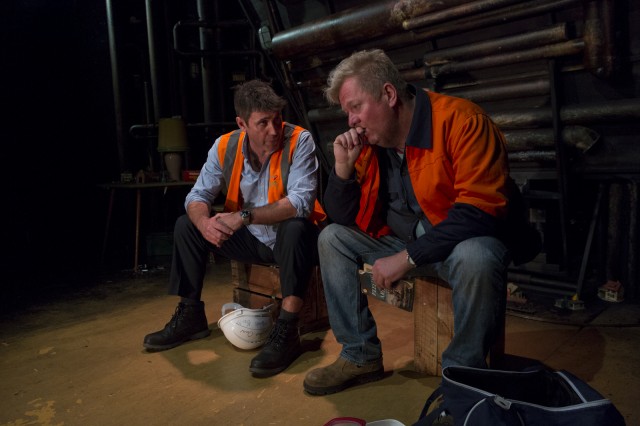09.10.17
Di Kelly is an Associate Professor at University of Wollongong, researching employment and industrial relations, particularly with reference to the steel industry. This note was written by her in 1992 and was included in the first publication of Diving For Pearls.
At the beginning of 1982 over twenty-one thousand people were employed at the Port Kembla steelworks near Wollongong in NSW. Within eighteen months this number had fallen to under fourteen thousand, and that decline continued for a decade. Ten years later there were fewer than eight thousand at the same plant. Many more thousands of jobs in the firms which served the steelworks have also disappeared. And the lives of those thousands who lost their jobs or resigned before it was too late would never be the same. Yet the experience of Wollongong was not unique.
From the mid-1970s the world market for steel became ever more competitive. On the one hand products such as plastic and aluminium were competing with steel. On the other hand former customers in newly industrialising countries like Korea, Taiwan and Brazil were now competitors with the old steel producing countries in Europe, North America and Australia. In industrial regions throughout the world, there were crises of mass reductions in employment and in many there was very little in the way of alternative employment for the redundant male workers. So sang Billy Joel in his 1981 hit song about American steel towns and the closure of the giant Bethlehem steelworks (which he called Allentown).
So the experience of those in this play is not just some rare Australian occurrence, and the fears and problems of Den and Barbara are the same as those that existed in the old industrial cities in the USA, the United Kingdom and throughout Europe. In Australia, like many countries in Europe, employees were not simply laid off. There was redundancy pay, or special severance pay for those who resigned voluntarily. Many of them rested their hope in the possibility that they could use their severance pay to start a small business, or gain new skills for new occupations.
So Christmas 1983 in the steel and coal towns of Australia was a strange time of fear and spending, when people in safe jobs crossed to the other side of the street to avoid those who might have lost or left their jobs; and those who no longer had jobs spent their money in the hope that jobs might miraculously appear. Then there were those who were not quite sure that they would still have a job by the following Christmas, nor what they would do if indeed they did lose their jobs. A lifetime working in a steel plant or a contract engineering firm does not make for portable skills. Many of the employees who resigned or were retrenched were unready and untrained for other sorts of work. Like Den who stays with his job for as long as he can in the hope that things might come good, they were often doomed to disappointment. But they stayed and hoped for better things, or tried to set up small businesses or trained for different jobs.
But the problem was that new occupations required new industries and investors were wary. Media stories of industrial cities almost always exaggerate the militancy of the workers, or tell tales of their conservative work habits. On the television news, stories of steel towns are almost always represented through pictures of chimneys, spouting what looks like plumes of smoke. The fact that those plumes are nothing more than steam would spoil a good story, and so the public image of steel towns remained flawed and the investors stayed away.
Many of the workers were migrants who had been coming to Australia since the 1940s in search of a better life. In the 1980s, they had to contend not only with increasingly inappropriate skills specific to old technology of heavy industry or steel production, but with the language and cultural differences found in a society which mostly pays only lip-service to multiculturalism.
It was worse for migrant women. Traditionally, industrial cities have woefully few jobs for women and in relatively recent cities like Wollongong, the situation was aggravated by the absence of other industries. Like Topsy, Wollongong had just grown from a small industrial centre, surrounded by a multiplicity of mining villages prior to World War II, to a burgeoning unplanned, under-resourced city in the 1960s and 1970s, its growth in population outpacing the social and economic infrastructure needed to support such a city. To be sure, women with few recognised skills could work in clothing factories, with draconian working conditions easily enforced because of the vast pool of unemployed women ready to replace those who questioned the rules, but there were only a few of even these undesirable sorts of jobs. There were office jobs too, but not many. So there were few jobs for women, but especially migrant women. Barbara’s desperate attempts to change her appearance and her vowels underline the even greater problems which would face migrant women who had to contend with language difficulties and prejudice, probably not in that order. In an international downturn in the market, those with least skills, and the least portable skills are the most vulnerable.
But life in the steel towns is one of contradictions, as we see in the play. Coal and steel sandwiched between superb beaches and miles of rainforest. Heavy industry is not pretty, but it is surprisingly limited in its impact on the environment. The worst pollution may come from the nearby metropolis. Within a mile or two of the engineering district, the new international resort can justifiably portray flawless images of sun, sea and sand. There is no dirt, no dust, no smell of industry.
It is not surprising then, that when the steel cities reeled from the shocks of workforce reductions, they looked to these features as possible alternatives to the making of steel and the hewing of coal. Gradually, over the years following the first major reductions, the local authorities, commercial organisations and trade unions cajoled and enticed new industries in the hope that never again would the town put all its economic reliance on a single industry.
Despite all the best efforts, however, recovery was not fast enough and there were never enough jobs to go around—particularly for those with fewest modern skills or vulnerable in other respects, such as older workers, younger workers, women, migrants, Aborigines—so many of whom wanted to work but for whom there were just no jobs. And then came the recession of the 1990s…
Diving for Pearls runs until 28 October.
Book now


